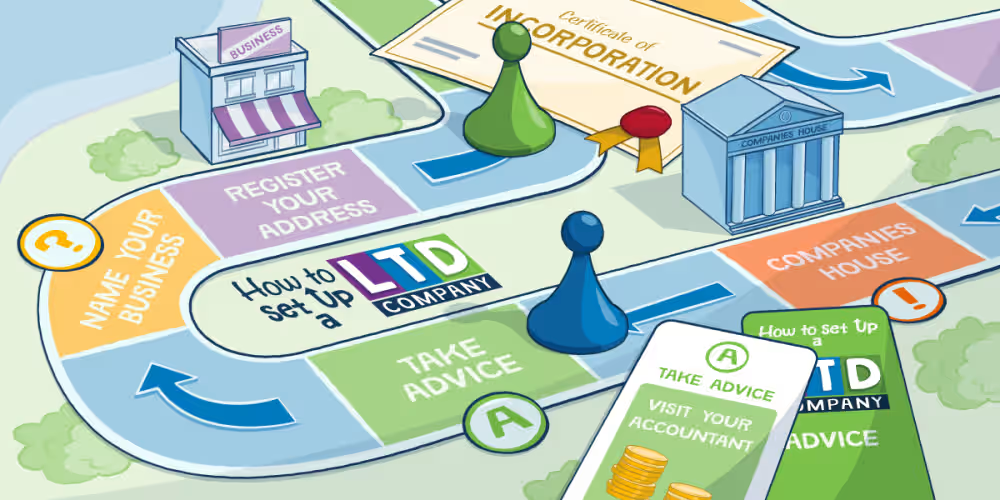What Is a Limited Company?
A limited company is a legally separate business entity where the liability of its owners (shareholders) is limited to their investment in the company. This means that the personal assets of the owners are protected, and they are not personally responsible for the company’s debts.
Operating as a Limited Company
Many small businesses opt for a limited company structure as it offers significant tax benefits compared to operating as a sole trader or partnership. However, to maximise these benefits, the company must be set up and managed correctly. A limited company is an independent entity, meaning all financial aspects, such as bank accounts, assets, and contracts, are separate from the personal finances of its owners. In contrast, a sole trader’s business and personal finances are legally considered the same.
How to Set Up a Limited Company
Setting up a limited company is a straightforward process, typically involving three key steps:
Registering with Companies House – The company must be officially registered, which can usually be done within 24 hours through a formation agent or accountant.
Appointing Directors – The director is responsible for managing the company and making business decisions.
Choosing Shareholders – Shareholders own the company. In many small businesses, the directors and shareholders are the same individuals.
Understanding the UTR Number
A Unique Taxpayer Reference (UTR) number is issued by HMRC once your company is registered. This number identifies your company for tax purposes. Directors also receive a personal UTR for their individual tax affairs.
Keeping Accurate Bookkeeping Records
Bookkeeping involves recording daily business transactions and is essential for preparing financial statements and tax returns. Keeping up-to-date records helps monitor business performance and ensures compliance with tax regulations.
How Often Should Bookkeeping Be Done?
It is advisable to complete bookkeeping tasks on a weekly or monthly basis. Regular updates minimise errors and provide a clear picture of your business finances.
Claiming Business Expenses
A business bank account is recommended to separate personal and company transactions. Some allowable business expenses that can reduce your Corporation Tax liability include:
- Travel and mileage costs
- Employee salaries
- Home office expenses (utilities, rent, etc.)
- Marketing and advertising costs
- Business insurance
- Professional fees (accountants, legal services, etc.)
- Equipment and furniture purchases
What Are Dividends?
Dividends are payments made to shareholders from company profits. Directors must formally declare dividends, record the decision, and issue a dividend voucher before distributing funds.
Understanding the financial year
A company’s financial year determines the period for which it must prepare its accounts and tax returns. This period typically ends 12 months after the date of company formation, but it can be adjusted if needed.
Corporation Tax
Corporation Tax is payable on a company’s taxable profits. The current rate varies between 19-25%, which is significantly lower than the combined Income Tax and National Insurance rates for sole traders.
Paying Your Corporation Tax
Corporation Tax is due within nine months and one day after the financial year ends. Payment options include:
- Bank transfer
- Direct debit
- Online card payment
- Bank giro or Post Office payment
Confirmation statement
A confirmation statement updates Companies House with current company details, including directors, shareholders, and registered addresses. This must be filed annually.
Submitting Company Accounts
We follow a structured process to prepare and submit your accounts:
- Reminder Notification – We inform you when your accounts are due and request necessary records.
- Account Preparation – Our accountants compile and review your financial statements.
- Final Submission – Once you approve the accounts, we submit them to HMRC and Companies House.
Deadlines and Penalties
- Company accounts must be submitted within nine months of the financial year-end; late submissions incur a £150 penalty.
- Corporation Tax returns must be filed within 12 months of the year-end, with a £100 penalty for late submission.
- Corporation Tax must be paid within nine months and one day to avoid interest and surcharges.
How to take money from your limited company
For tax efficiency, many directors take a small salary up to the National Insurance threshold and withdraw the remaining income as dividends. This strategy minimises Income Tax and National Insurance contributions while ensuring compliance with tax laws.
VAT
Businesses must register for VAT if their turnover exceeds £85,000 in a 12-month period. However, voluntary registration can be beneficial if your customers are VAT-registered. For more information, don’t hesitate to get in touch with an advisor.
Employing staff
If you hire employees, you must register as an employer with HMRC and operate a payroll system. This ensures that Income Tax and National Insurance contributions are deducted correctly.
It can’t actually be tax efficient to hire staff for your company, as paying salaries can reduce your tax burden.
Business insurance
Having the right business insurance protects against financial risks. Key policies include:
- Employer’s Liability Insurance – Required if you have employees.
- Public Liability Insurance – Covers claims for injuries or damages caused to third parties.
- Professional Indemnity Insurance – Protects businesses that provide advice or professional services.
Why a limited company is more tax efficient
Operating as a limited company offers key tax advantages over being a sole trader, including:
- Lower Tax Rates – Corporation Tax rates (19-25%) are lower than Income Tax rates (up to 45%) for sole traders.
- Tax-Efficient Withdrawals – Directors can structure earnings to reduce personal tax liabilities by taking a mix of salary and dividends.
- Expense Deductions – A limited company can claim a wider range of business expenses, reducing taxable profits.
- Limited Liability Protection – Owners are not personally responsible for company debts, unlike sole traders who have unlimited liability.
By choosing to operate as a limited company, business owners can enjoy financial protection, reduced tax liability, and greater opportunities for growth. If you need help setting up and managing your limited company, our team is here to assist you every step of the way!

